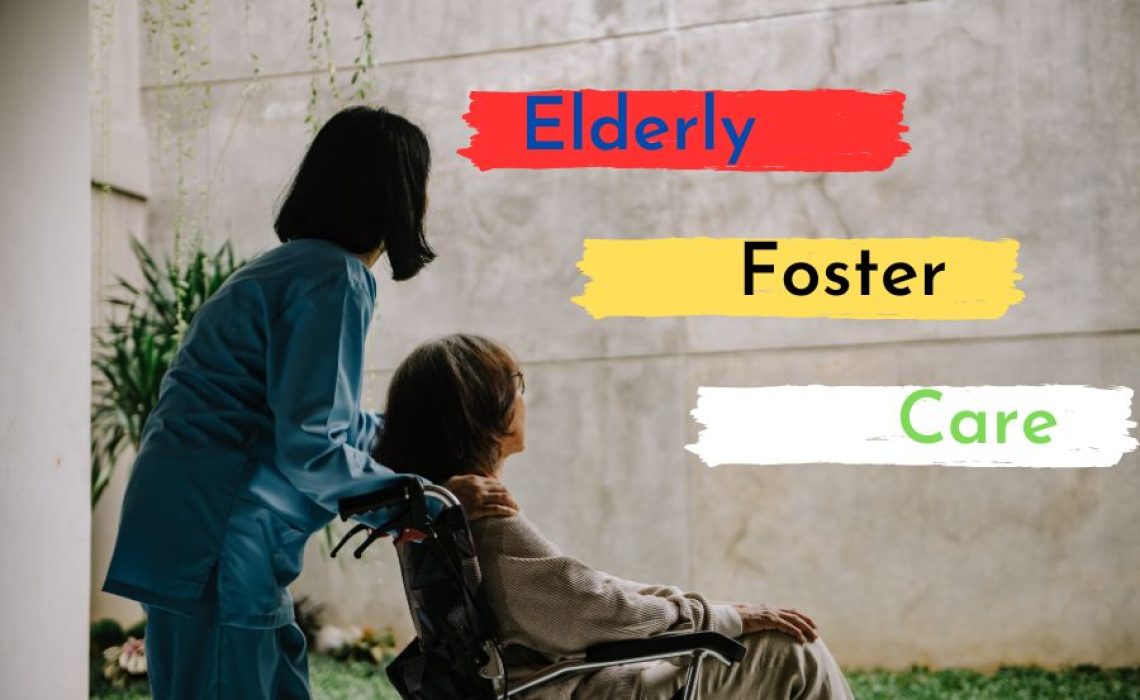In a society where the population is progressively ageing, the conversation around quality care for seniors becomes increasingly critical. One aspect of this dialogue centres around elderly foster care, a system designed to provide a nurturing, family-like environment for older adults who can’t live independently due to physical, mental, or emotional health concerns.
Traditionally, discussions around foster care have primarily focused on children. However, the concept applies equally to the elderly, particularly as we witness a rise in the population of older adults in need of care. The importance of discussing elderly foster care lies in acknowledging and addressing the needs of this growing demographic, ensuring their well-being, dignity, and quality of life.
This blog aims to shed light on adult foster care, discussing its importance, benefits, and challenges. We will delve into the current scenario, the role of government and private institutions, and how one can become an adult foster care provider. Through this exploration, we hope to inspire more people to consider this noble and necessary undertaking, ensuring that our seniors receive the love, care, and respect they deserve in their twilight years.
Table of Contents
Toggle1. Understanding Elderly Foster Care
A. Definition of Elderly Foster Care
Elderly foster care, also known as adult foster care or senior foster care, is a system where older adults who cannot live independently due to physical, mental, or emotional issues are placed in the care of certified caregivers. These caregivers provide a homely environment, personal care, and assistance with daily living activities, aiming to enhance the quality of life for these seniors.
B. The Need for Elderly Foster Care in Society
As our population ages, the number of seniors needing assistance is growing rapidly. While some older adults have family support, others may not have relatives capable or available to provide the necessary care. Adult foster care fills this gap, offering a solution that combines professional care with a family-like environment. It caters to seniors who do not need intensive medical care offered in nursing homes but cannot live independently either.
C. Differences and Similarities between Child and Elderly Foster Care
While the principles of child and adult foster care are similar—providing a safe, nurturing environment for those unable to live independently—there are distinct differences. Child foster care often focuses on temporary placement and possible reunification with biological parents or adoption. In contrast, elderly foster care primarily provides long-term care for seniors whose families cannot provide the needed care or who have no immediate family.
However, both forms of foster care value the well-being of the individuals, aiming to provide them with quality care, love, respect, and a sense of belonging. Both also require the caregivers to undergo thorough assessment and training to ensure they can provide the appropriate care.
2. The Current Scenario
A. Statistics related to Elderly Foster Care
As of today, the number of seniors requiring care is increasing globally due to a surge in life expectancy and the ageing of the baby boomer generation. The U.S. Census Bureau reports that by 2034, there will be more people over 65 than under 18 for the first time in history. This demographic shift significantly impacts the need for elderly care, including adult foster care.
B. The State of Elderly Foster Care Facilities and Caregivers
Elderly foster care facilities, often referred to as adult family homes or personal care homes, offer a more personalized and homelike environment than larger senior living facilities. These homes usually accommodate a small number of residents, providing more one-on-one care. While these facilities are widespread, the demand for such homes is escalating due to the growing senior population.
As for caregivers, there is a rising demand for qualified individuals passionate about elderly care. However, there’s a noticeable shortage of caregivers, as the role is often physically and emotionally demanding, with the added challenges of relatively low pay and lack of societal recognition. Consequently, there’s a pressing need to attract more people to this profession, improve their training, and enhance their working conditions.
In essence, while the adult foster care system is functional and provides crucial support for many seniors, it is under considerable strain due to the growing senior population and the shortage of caregivers. As such, the system requires significant attention, improvement, and expansion to meet the rising demand.
3. Benefits of Elderly Foster Care
A. Enhanced Quality of Life for Seniors
Adult foster care homes provide seniors with a homelike environment where they can maintain a sense of normalcy and dignity. These homes often offer personalized care that caters to each individual’s specific needs, thus enhancing their overall quality of life.
B. Social Interaction and Reduced Loneliness
In foster care homes, seniors have opportunities for social interaction with caregivers and other residents. This sense of community can greatly reduce feelings of loneliness and isolation, which are common among the elderly living alone. Social engagement also helps keep their minds active, which is essential for cognitive health.
C. Professional Care and Assistance
Foster care for the elderly ensures that seniors receive professional care tailored to their needs. This includes help with daily activities like bathing, eating, and medication management. In addition, some homes offer therapeutic activities like physical therapy or memory care services, offering a comprehensive care package that eases the burden on families and ensures seniors are well taken care of.
In conclusion, adult foster care plays a crucial role in providing a nurturing environment for seniors who can’t live independently. It enhances their quality of life, fosters social interaction, and provides professional care and assistance, ensuring that their twilight years are spent in comfort and dignity.
4. Challenges in Elderly Foster Care
A. Financial Constraints
Providing quality care for seniors can be expensive. Funding for elderly foster care can be a significant challenge, particularly for those without insurance coverage or sufficient personal funds. While some costs may be covered by government programs or non-profit organizations, these resources may not be enough to cover all the expenses associated with providing comprehensive care.
B. Health and Medical Issues
As seniors age, they are likely to experience a range of health issues, including chronic conditions and cognitive decline. These medical issues require specialized care, and managing them can be both emotionally and physically taxing for caregivers. In addition, the potential for emergencies increases, necessitating caregivers to be well-trained and prepared for such situations.
C. Emotional and Psychological Concerns
Transitioning to a foster home can be emotionally challenging for seniors, who may feel a sense of loss or displacement. They might experience feelings of loneliness, sadness, or anxiety. Caregivers must be equipped to provide emotional support and facilitate the transition. Additionally, caregivers themselves may face emotional strain due to the demanding nature of their role.
Despite these challenges, it’s important to remember that they are not insurmountable. With proper resources, training, and support, elderly foster care homes can provide seniors with a safe, loving, and nurturing environment. It’s crucial to address these challenges head-on to improve and expand the elderly foster care system, ensuring that it can meet the growing demand effectively.
5. The Role of Government and Private Institutions
A. Current Legislation Regarding Elderly Foster Care
Government plays a crucial role in regulating and supporting elderly foster care. Legislation such as the Older Americans Act in the United States provides funds and resources to support various services for older adults, including home and community-based services. Laws also establish the standards for adult foster care facilities, ensuring they provide a safe and nurturing environment for seniors.
B. Role of Private Institutions in Supporting Elderly Foster Care
Private institutions, including nonprofit organizations and private care homes, play a significant role in the elderly foster care system. They not only provide care services but also work towards raising awareness about the needs of elderly individuals. These institutions often collaborate with government agencies to ensure the availability of resources and services for seniors.
C. Resources Available for Elderly Foster Care
Both governmental and private institutions provide resources that support elderly foster care. These include financial assistance programs, caregiver training and support programs, and resources for health and therapeutic services. These resources are essential for maintaining and improving the quality of elderly foster care services.
In conclusion, the collaboration of government and private institutions is crucial in managing and improving the adult foster care system. Through legislation, support programs, and resources, these institutions can ensure the provision of quality care for seniors while also supporting the caregivers who make these services possible.
6. The Process of Becoming an Elderly Foster Care Provider
A. Requirements and Qualifications
Becoming an adult foster care provider involves meeting specific criteria. Requirements may vary by location but typically include being at least 21 years old, passing a background check, and demonstrating financial stability. A potential caregiver should also display qualities such as patience, empathy, and the physical ability to assist with daily tasks.
B. Training and Preparation
Training is a crucial part of becoming a foster care provider for the elderly. Prospective caregivers typically undergo a series of training sessions that cover topics like first aid, medication management, understanding and managing various health conditions, and emotional support. This training ensures that caregivers are well-equipped to provide quality care.
C. How to Apply
The application process also varies by location but generally involves applying through a local health or social services department. This usually includes filling out an application form, undergoing a home inspection to ensure it’s suitable for providing care and attending an interview. Once approved, the caregiver may need to obtain a license, depending on local regulations.
Becoming an elderly foster care provider is a significant responsibility, but it can also be an incredibly rewarding experience. With the right training, support, and a genuine desire to make a difference, caregivers can provide a nurturing environment that greatly enhances the quality of life for seniors.
7. Success Stories in Elderly Foster Care
A. Inspirational Stories of Successful Elderly Foster Care Providers
Around the world, there are countless stories of individuals and families who have opened their homes and hearts to care for the elderly. For instance, there’s the story of a retired nurse who transformed her home into an elderly foster care facility, providing not just medical care but also companionship and a sense of belonging to her residents. Then there’s the couple who, after raising their own children, decided to become foster caregivers for seniors, providing them with a warm, family-like environment in their twilight years.
B. The Impact of Elderly Foster Care on Seniors’ Lives
Elderly foster care can have a profound impact on seniors’ lives. There are countless stories of seniors who, after moving into foster care, experienced improvements in their physical health, mental well-being, and overall quality of life. For instance, there’s the story of an elderly man who, after years of living alone and struggling with depression, found a new lease on life when he moved into a foster care home. His health improved, he became more social, and he even started painting, a hobby he hadn’t pursued in years.
These success stories illustrate the potential of adult foster care to not just provide care for seniors but also to enrich their lives. They serve as a testament to the dedication and compassion of caregivers and are an inspiration for those considering becoming part of this vital service.
Conclusion
Reflecting on our exploration of elderly foster care, it’s clear that this system plays an invaluable role in our society. As our population ages, the demand for quality care for seniors is growing. Adult foster care meets this need by providing a nurturing, homely environment where seniors receive the care and companionship they need.
Despite the challenges faced in adult foster care, from financial constraints to health issues, the benefits undeniably outweigh the hurdles. With the enhanced quality of life for seniors, social interaction, and professional care, this system is an essential part of supporting our senior population.
The role of government and private institutions is vital in ensuring the effectiveness and growth of elderly foster care. Their collaboration, through legislation, resources, and support programs, helps maintain and improve this system.
Becoming an elderly foster care provider is a significant responsibility, but the stories of successful caregivers and the positive impact on seniors’ lives illustrate how rewarding it can be. As we navigate the challenges of an ageing population, it is heartening to see the difference that adult foster care can make.
In conclusion, adult foster care is more than just a system—it’s a testament to our commitment to ensuring that our seniors live their twilight years with dignity, care, and respect. As a society, we must continue to support and improve this vital service, recognizing the invaluable contribution of caregivers and the profound difference they make in the lives of our seniors.










2 thoughts on “Elderly Foster Care: Providing Quality of Life in Twilight Years”
Pingback: Foster Parent Requirements: A Comprehensive Guide
Pingback: The Navigating the Journey of Caregiving for Older Adults